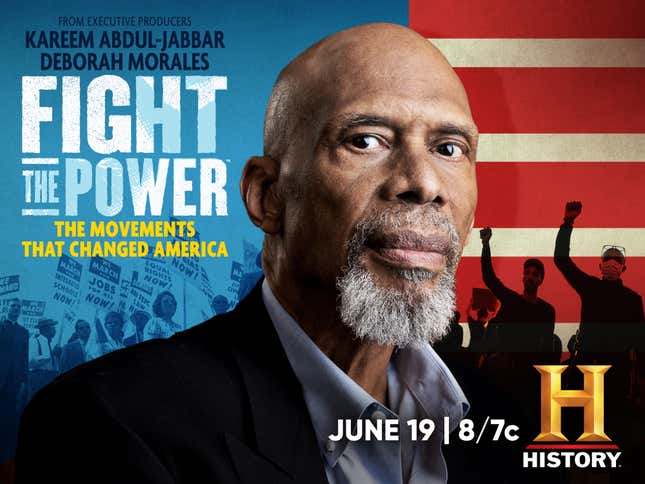
When you hear the name Kareem Abdul-Jabbar, not only is his status as an NBA legend cemented until the end of time, but his activism off the court is arguably just as profound. And as that passion for social justice has manifested in a multitude of ways throughout the course of his career, his latest endeavor seeks to put the fight for equality and inclusion into proper context.
As we previously reported at The Root, the six-time NBA champ is executive producing Fight the Power: The Movements That Changed America, a new one-hour documentary “which will chronicle the key movements that have made a major impact throughout U.S. history, including the labor movement of the 1880s, women’s suffrage and civil rights, as well as LGBTQ+ and Black Lives Matter movements.” The UCLA alum will also serve as narrator for the project, which is set to debut on the History Channel during Juneteenth.
Ahead of its premiere, Abdul-Jabbar spoke to The Root about the film and explained his decision to become involved with such a powerful documentary.
“These types of movements have always been a part of the American DNA on what is fair and just in America,” he said. “So these issues really appeal to Americans across a whole lot of different lives. I thought that showing what they all have in common would be the best way to approach it because people want to draw lines in between. And really, it’s all based on the same need for equal treatment and transparency.”
In discussing the development of the film, he also shared the crucial role that civil disobedience has played throughout the course of American history.
“I don’t think we’d have a functioning democracy without civil disobedience,” he said. “Civil disobedience is the way for people to make their own personal issues well known and get people to react to them in real terms.”
He continued, “The people in power want to keep power and that you cannot expect people just to give it up. You have to make demands and be persistent in their demands until the people who do have the power to give it up and deal with things in a more equitable and transparent fashion.”
At 74 years old, the Lakers legend has witnessed the evolution of social activism first hand. From his own Cleveland Summit in 1967, in which he, Jim Brown, Muhammad Ali, and other prominent athletes helped redefine the boundaries between sports and politics, to today’s social media age, in which a simple tweet can spark an entire revolution.
“I just think activism has gone from a few groups to an even broader number of groups,” he said. “Because as inequalities are exposed or discovered, you’re going to get more people protesting the fact that they were cheated. So it’s a process of discovery and then reaction to what you discovered.”
The six-time NBA MVP also has some words of advice for those eager to become more active in their communities.
“No one has to deal with being abused,” he said. “If you feel like you’re being abused go talk to somebody about it because you’re probably not the only one. And if you see abuse happening or wrongdoing, speak out about it. You’ll find out that there are other people that are aware of it and that’s how things get started.”
And for those looking for a blueprint on how to advocate for social justice in their communities, look no further than Fight the Power.
“Protest is a common element to so many different aspects of American society,” Abdul-Jabbar said. “You have the women’s suffrage movement, right? You have the March on Washington. You have the Stonewall riots, which had to do with gay rights, and then the L.A. riots that had to do with the Rodney King incident. There’s so many different aspects of why people protest and take to the streets. Just recently, the George Floyd protest of last summer [...] was a moment where we could see that what Black Americans had been talking about for so long was a reality. And white Americans took note of that and didn’t continue to try to say that it was just a figment of our imagination. This is progress and we have to acknowledge it and build on it.”
Fight the Power: The Movements That Changed America premieres Saturday on the History Channel.

